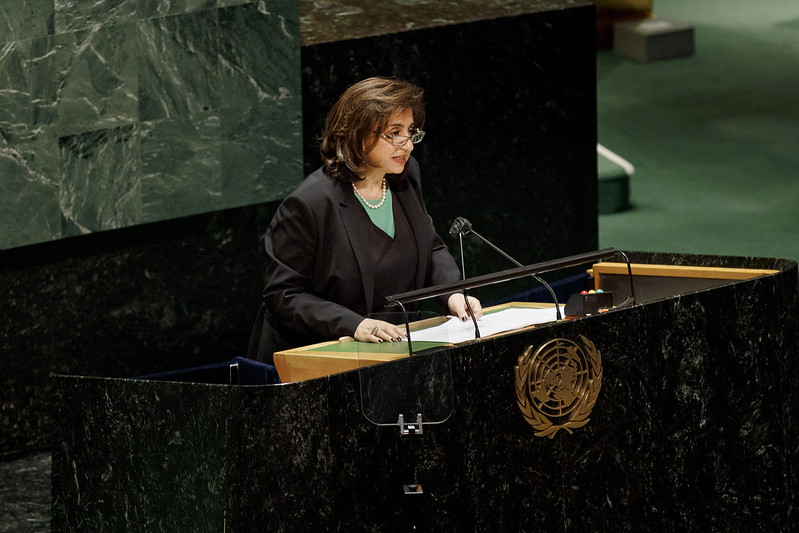The message delivered by the speakers during the opening of the sixty-sixth session of the Commission on the Status of Women was loud and clear. The climate and environmental crisis which was described by Secretary-General António Guterres as “the defining issues of our time” could only be altered and prevented by ensuring that women and girls’ leadership and meaningful contributions in these areas were included in any decision making processes.

Pictured: United Nations Secretary-General António Guterres addresses the opening session of the Commission on the Status of Women Photo: UN Women/Ryan Brown
However, this goal remained a challenge according to Secretary-General António Guterres.
“Unprecedented emergencies of the climate crisis, pollution, desertification, and biodiversity loss, coupled with the COVID-19 pandemic, and the impact of new and ongoing conflicts”, had “accelerated and intensified into widespread and interlinked crises that affect us all”. However, he added that the damage was not meted out equally, “as everywhere, women and girls faced the greatest threats and the deepest harm.” He gave the audience a chilling example: “When climate disasters strike, as they do with increasing frequency, research shows that women and children are up to 14 times more likely than men.”
The Executive Director of UN Women, Sima Bahous agreed observing that, “as with all crises, climate change” had “also exacted: its highest price from women and girls”. Especially from those who were “already being left behind” such as female-headed households; rural women; women who cannot access land; young girls who must walk further to fetch water in times of drought and missing school to do so; older women; women without access to finance – and the list goes on.”

Pictured: UN Women Executive Director Sima Bahous addresses the opening session of the Commission on the Status of Women Photo: UN Women/Ryan Brown
However, despite being negatively affected by climate change, all of the speakers agreed that women and girls remained stewards of our planet as they possessed the knowledge and ability to mitigate climate change and come up with solutions. Yet they were still “largely an untapped source.”
How big of a problem was this? Secretary-General António Guterres informed the audience that gender discrimination meant “just a tiny proportion of landowners and leaders are women,” adding “that their needs and interests” were “often ignored and pushed aside in policies and decisions on land use, pollution, conservation, and climate action.” For example, only one-third of 192 national energy frameworks included gender considerations, and they were rarely considered in climate financing. This demonstrated “once more that we live in a male-dominated world with a male-dominated culture.” The UN chief spelled out “a millennium of patriarchy that excluded women and prevents their voices from being heard.”
All agreed that we needed to ensure that women and girls’ leadership and meaningful contributions in these areas were included in decision-making processes. They were not shy when offering solutions to this problem. For example, amidst birds chirping in the background, Executive Director of the UN Environment Programme (UNEP) Inger Andersen observed that the world “had enough of male-dominated solutions”. She explained that, while women were stewards of our planet whether it involved peace, or the environment, in 2020 only 15 % of women held the position of top jobs in environmental sectors. As such, male-dominated environmental sectors came up with male solutions. And just in case we did not believe this she proceeded to list some examples. In a triple threat world, the climate crisis, biodiversity loss, and pollution and waste are already making our world more unequal and divided according to Ms. Anderson. “70% of women” still lived in poverty. Climate crisis impacts that reduced agricultural productivity and destroyed property impacted women greatly, as did a 300% increase in domestic and gender-based violence following tropical cyclones and typhoons according to Ms. Johnson. Women’s work took longer. Violence against women who were environmental defenders was also on the rise. The Climate crisis was making our world more divided and unequal.
General Assembly President Abdulla Shahid agreed with this assessment pointing out that in the UN’s 76 years, just four women had been elected Assembly President and no woman had ever been chosen as Secretary-General. Mr.Shahid had a solution. “This needs to be corrected,” he asserted. “The UN cannot call for the implementation of gold standards throughout the world as far as gender equality and women’s empowerment is concerned but not implement this standard at home”. Mr. Shahid added that he would “personally” lead in calling for the next Secretary-General to be a woman and asked the audience to “Join me in this clarion call,” at which point Mr. Shahid was met with applause.
The consensus was clear. Our global challenges “were interconnected.” There will “be no progress for one, without progress for all.” Ms. Bahous observed. The climate emergency and gender inequality are “two of the most pervasive challenges” we face. “We must rise to them together” as it is “what we owe all future generations.” Ms. Bahous added. Secretary-General António Guterres observed that gender equality and women’s rights “must be at the heart of a renewed social contract that is fit for today’s societies and economies.” Moreover, as we could not “separate the perilous state of peace in our world from long-standing structures of patriarchy and exclusion,” citing Russia’s invasion of Ukraine as “another clear demonstration of this everywhere”; “women and girls must be front and center leading the way.”

